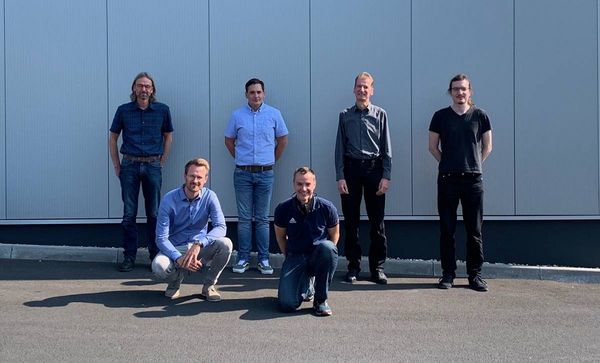Berger Blog
Model project at the University of Wuppertal to optimize knife production
Model project at the University of Wuppertal to optimize knife production

Participating in the research project (from left): Jörg Nußbaum and Sebastian Zeleny from the Berger Gruppe, Prof. Dietmar Tutsch and Tobias Wiegard from the university, and kneeling: Jannik Schuppener (Ruhr University Bochum) and Dr. Kai Uwe Paffrath from the TKM Group. Photo: TKM/Dr. Kai Uwe Paffrath
WZ, 6th of January 2021
from Timo Lemmer
Wuppertal/Remscheid Researchers want to gain insights into the use of artificial intelligence with the TKM Group from Remscheid.
A research project with strong participation of the Bergisch Land wants to optimize knife production: If Prof. Dietmar Tutsch from the University of Wuppertal and his colleagues have their way, smarter, more cost-effective and environmentally friendly production is possible. To this end, an AI (artificial intelligence) is currently being developed that will primarily take into account and analyze the material-technological aspects of production. Prof. Sebastian Weber, University of Bochum, will then translate these results into optimizations.
"Up to now, there have been mathematical models that use different approaches to reveal potential for improvement. In this project, we want to break new ground and develop computer-based optimization approaches based on production data, machine parameters and material data. To this end, the data of the production process will be recorded in each individual sub-step," explains automation expert Tutsch. In turn, materials expert Weber adds, there are a variety of approaches to be able to react directly to the respective machining processes, for example in the heat treatment of the components, together with the approaches of AI. And Dr. Kai Uwe Paffrath, representing industry partner TKM Group, adds: "This data is then analyzed with the help of the computer, which can derive much more from it than was previously possible. To interpret the data, the AI needs a basic understanding of the process." The researchers are working on this primarily in Wuppertal, the materials experts in Bochum, and the practitioners at TKM and Heinz Berger Maschinenfabrik.
The industry partners involved in the project are TKM GmbH as consortium leader headed by Thomas Meyer and Dr. Kai Uwe Paffrath as project manager, Heinz Berger Maschinenfabrik GmbH & Co. KG around Dr. Andreas Groß and project manager Jörg Nussbaum. The scientific execution lies with the Chair of Automation Technology/Informatics in Wuppertal around Prof. Dietmar Tutsch and the Chair of Materials Technology around Prof. Sebastian Weber in Bochum.
The somewhat unwieldy title of the project "Knowledge Discovery in Production - Intelligent Optimization of the Production of Molded Products Using Knowledge Discovery Methods" - KnowDiPro for short - is integrated into a larger research network at the family-run Remscheid-based TKM Group. "We have initiated various projects that are intended to contribute to resource efficiency and environmental protection with measures in the area of digitalization and automation of manufacturing."
KnowDiPro is specifically about optimizing knife production, he said. The project is centered around circular knives - which are responsible in industry, for example, for cutting the so-called mother rolls of toilet paper to standard household dimensions. "There is a lot of potential for optimization," says Tutsch. "For example, there are many grinding processes in which a lot of material is ground down." On the one hand, the quantity here should be reduced, on the other hand, the metal should be reused. Tutsch: "Every knife should be optimized individually, and in every production step. This starts with the hardening of the tool steel used, which is very energy-intensive." It is precisely at this point that the Bochum expertise is of decisive importance. Once the steel has been individually analyzed, the required hardening parameters of each blade can be adjusted. "This gives us process stability," says Paffrath: "Errors are avoided to a greater extent or detected earlier.
There are already many suppliers on the market that can collect all the information from the individual production steps. However, there is always a problem as to what can be gained from this information in the end. Paffrath: "That's what we want to capture technologically, using the combined expertise of materials technology and information technology."
In the first step of the project, which is scheduled to run for three years, the project participants are trying to bring about optimizations around circular knives. "In the long term," says Tutsch, "the highly complex topic is designed so that it can be transferred to other types of products." The state of North Rhine-Westphalia is funding the project as part of the "Progress.NRW" program with the aim of allowing other companies to participate in the results.
The partner in the mechanical engineering sector, Heinz Berger Maschinenfabrik, is then to ensure in the transfer of knowledge to industry that small and medium-sized companies can benefit from the advances. Tutsch: "We ultimately want to use the methods in other projects as well. The hope is very high that in the end many companies and businesses will be able to reap benefits." The cutlery and tool industry, which characterizes the Bergisches Land region, should benefit overall, he says.
www.wz.de/nrw/wuppertal/modellprojekt-der-universitaet-wuppertal-soll-messerproduktion-optimieren_aid-55544233
